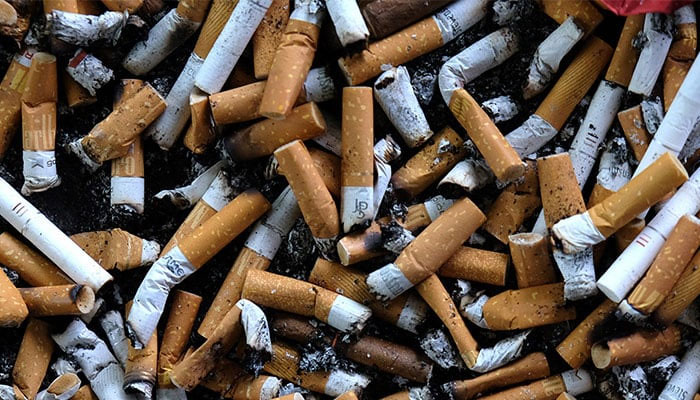KP govt decision to increase tobacco taxation backed
PESHAWAR: Blue Veins and the Provincial Alliance for Sustainable Tobacco Control have commended the Khyber Pakhtunkhwa government for the landmark decision to increase the local tobacco tax (cess) by 400 percent.
A press release said the substantial increase could generate over Rs2 billion ($7.2 million) annually, which might be dedicated to enhancing health facilities across the province. This move marks the first increase in the provincial tobacco cess since 1996.
The KP government has also introduced a ground-breaking provincial excise duty on tobacco through the enactment of the Khyber Pakhtunkhwa Provincial Excise Duty (Unmanufactured) Tobacco Act 2024.
For the first time, this tax will be levied on tobacco companies at the rate of Rs50 per kilogram.An important aspect of the new legislation is the mandatory registration of Green Leaf Threshing (GLT) units, which will significantly contribute to the establishment of a comprehensive track-and-trace system in KP.
Qamar Naseem, programme manager at Blue Veins, stated that effective tobacco control was crucial for safeguarding public health and reducing the economic burden of tobacco-related diseases.
Imran Takkar, a civil society activist, said the KP government’s decision was a major victory for public health and tobacco control.“It demonstrates a firm commitment to protecting citizens from the harms of tobacco, in line with international standards,” he added.
The civil society organizations praised Chief Minister Ali Amin Gandapur, minister of Excise and Taxation, director general of Excise, and other officials for the decision on tobacco tax.It also demanded that the KP government reenact the Tobacco Vendor Act, which will regulate the sale of tobacco products and restrict their access to minors.
-
 Critics Target Palace Narrative After Andrew's Controversy Refuses To Die
Critics Target Palace Narrative After Andrew's Controversy Refuses To Die -
 Sarah Ferguson’s Delusions Take A Turn For The Worse: ‘She’s Been Deserted’
Sarah Ferguson’s Delusions Take A Turn For The Worse: ‘She’s Been Deserted’ -
 ICE Agents 'fake Car Trouble' To Arrest Minnesota Man, Family Says
ICE Agents 'fake Car Trouble' To Arrest Minnesota Man, Family Says -
 Camila Mendes Reveals How She Prepared For Her Role In 'Idiotka'
Camila Mendes Reveals How She Prepared For Her Role In 'Idiotka' -
 China Confirms Visa-free Travel For UK, Canada Nationals
China Confirms Visa-free Travel For UK, Canada Nationals -
 Inside Sarah Ferguson, Andrew Windsor's Emotional Collapse After Epstein Fallout
Inside Sarah Ferguson, Andrew Windsor's Emotional Collapse After Epstein Fallout -
 Bad Bunny's Star Power Explodes Tourism Searches For His Hometown
Bad Bunny's Star Power Explodes Tourism Searches For His Hometown -
 Jennifer Aniston Gives Peek Into Love Life With Cryptic Snap Of Jim Curtis
Jennifer Aniston Gives Peek Into Love Life With Cryptic Snap Of Jim Curtis -
 Prince Harry Turns Diana Into Content: ‘It Would Have Appalled Her To Be Repackaged For Profit’
Prince Harry Turns Diana Into Content: ‘It Would Have Appalled Her To Be Repackaged For Profit’ -
 Prince William's Love For His Three Children Revealed During Family Crisis
Prince William's Love For His Three Children Revealed During Family Crisis -
 Murder Suspect Kills Himself After Woman Found Dead In Missouri
Murder Suspect Kills Himself After Woman Found Dead In Missouri -
 Sarah Ferguson's Plea To Jeffrey Epstein Exposed In New Files
Sarah Ferguson's Plea To Jeffrey Epstein Exposed In New Files -
 Prince William Prepares For War Against Prince Harry: Nothing Is Off The Table Not Legal Ways Or His Influence
Prince William Prepares For War Against Prince Harry: Nothing Is Off The Table Not Legal Ways Or His Influence -
 'How To Get Away With Murder' Star Karla Souza Is Still Friends With THIS Costar
'How To Get Away With Murder' Star Karla Souza Is Still Friends With THIS Costar -
 Pal Reveals Prince William’s ‘disorienting’ Turmoil Over Kate’s Cancer: ‘You Saw In His Eyes & The Way He Held Himself’
Pal Reveals Prince William’s ‘disorienting’ Turmoil Over Kate’s Cancer: ‘You Saw In His Eyes & The Way He Held Himself’ -
 Poll Reveals Majority Of Americans' Views On Bad Bunny
Poll Reveals Majority Of Americans' Views On Bad Bunny




